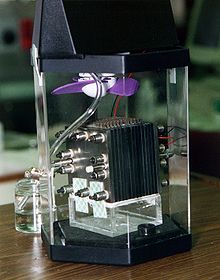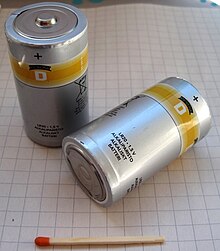Electrochemistry
Electrochemistry refers to several different areas within chemistry. On the one hand it is a synthesis method, preparative electrochemistry or electrolysis or electrosynthesis, on the other hand it is a sub-area of physical chemistry that deals with the relationship between electrical and chemical processes. There are also electrochemical methods in analytical chemistry . In addition to large-scale electrochemical synthesis methods, technical chemistry also knows battery and fuel cell technology and electroplating technology .
content
When a chemical reaction is linked to an electric current , it is an electrochemical process. Either the redox reaction is forced by an externally applied electrical voltage ( electrolysis ), or a measurable voltage is caused by the chemical reaction of suitable substances ( galvanic element ). These voltages are characteristic of the respective reactions and are documented on a scale, the electrochemical series . The direct electron transfer between molecules , ions or atoms is not an electrochemical process; The spatial separation of oxidation and reduction is typical of electrochemistry .
Electrochemical reactions take place in a galvanic cell and always as redox reactions . During electrolysis and the charging of an accumulator , energy is supplied, while discharging a battery or drawing electricity from a fuel cell produces electrical energy that corresponds to the enthalpy of reaction in reversible processes .
The current that occurs in such reactions is an easy-to-measure parameter that is very useful for monitoring. A current-voltage characteristic curve is often recorded, which shows the measured current when the voltage varies. The shape of such a characteristic depends not only on the usual reaction parameters (concentration of the substances involved, temperature, size of the reactive interfaces) but also on the speed of the voltage change.
The redox processes, which are decisive for electrochemistry, take place at the electrode - electrolyte phase boundary . One can therefore define: Electrochemistry is the science of the processes at the phase boundary between an electron conductor ( electrode ) and an ion conductor ( electrolyte ).
history
Luigi Galvani's experiments with frogs' legs gave an important impetus to the development of electrochemistry : the muscles contracted when they came into contact with various metals . Alessandro Volta manufactured the first modern working battery in 1799 . Long before the development of the generator , this was an extremely important source of current and voltage, which made many important discoveries possible, especially the first presentation of the metals sodium , potassium , barium , strontium , calcium and magnesium in 1807 and 1808 by Humphry Davy .
At the end of the 18th century, Johann Wilhelm Ritter made important contributions to the subject of galvanism and constructed a simple accumulator. Michael Faraday , who introduced the terms electrode , electrolyte , anode , cathode , anion and cation , discovered the basic laws of electrolysis in 1832 . In 1959 Jaroslav Heyrovský received the Nobel Prize in Chemistry for developing an electrochemical analysis method , polarography .
Already in the years 1887/1894 Wilhelm Ostwald recognized that powerful fuel cells for the energy supply would have to offer enormous future potential. Accordingly, one of the important developments of the 20th century was the further development of the fuel cell, initially primarily for applications in space: For the Apollo program , which led to the moon landing in 1969, hydrogen fuel cells were developed that also provided drinkable water for the astronauts. Hydrogen fuel cells also provided power in the space shuttle .
Applications
- Manufacture of chemical substances
- Reduction of metal salts for the production of base metals, especially by melt electrolysis , e.g. B. for the production of lithium , sodium , potassium , calcium , magnesium and aluminum.
The electric current acts as a reducing agent . Since the voltage can be varied, the reducing force can be adjusted. Electric current is the strongest reducing agent in chemistry, with which the cations of the most base metals can also be reduced.
Electrolytic metal deposition is also used in electroplating . - Oxidation of anions , e.g. B. of halides , for example for the production of fluorine and chlorine in the chlor-alkali electrolysis
- The electric current allows redox reactions without the addition of reducing or oxidizing agents. Many other redox reactions can therefore be carried out particularly elegantly electrolytically or are only made possible. Mentioned in the preparative are organic electrochemistry the electrofluorination , the dimerization of acrylonitrile to adiponitrile or the Kolbe electrolysis . In the past, the electrochemical Grignard reaction for the production of tetraethyl lead was also important.
- Production of ozone - oxygen mixtures by electrolysis at high current densities
- The production of hydrogen z. B. by electrolysis of water or as a second product of chlor-alkali electrolysis
- Reduction of metal salts for the production of base metals, especially by melt electrolysis , e.g. B. for the production of lithium , sodium , potassium , calcium , magnesium and aluminum.
- Electroplating for the production of metallic coatings
- Provision of electrical voltage, especially for mobile applications, in
- Use of electric current or measurement of potential when performing chemical analyzes and investigations: electrochemical analysis , especially
- Voltammetry , e.g. As the cyclic voltammetry and polarography , a voltammetry at a dropping mercury electrode is
- Amperometry , e.g. B. the determination of an oxygen concentration with a Clark electrode or the electrochemical continuous glucose sensors
- Potentiometry ; this also includes studies with ion-selective electrodes , e.g. B. the pH electrode , the fluoride-selective electrode and the potassium-selective electrode
- Coulometry , e.g. B. also for the sensitive determination of water with the coulometric Karl Fischer method
- Electrogravimetry , especially for the reductive determination of metal ions such as Cu 2+
- Research is also being carried out on electrochemical DNA biosensors and electrochemical DNA sequencing.
- Electrochemical Impedance Spectroscopy
- Studies on thermodynamics and the mechanism of reactions, also important for corrosion research
See also
- electrolysis
- Bioelectrochemistry
- Electrochemical equilibrium
- Double layer
- Photoelectrochemistry
- Organic electrochemistry
- Nernst equation
- Electrochemical equivalent
- Butler-Volmer equation
- Blackboard equation
- Redox reaction
- oscillating response
- List of eminent battery researchers and electrochemists
literature
- Peter W. Atkins, Physical Chemistry , Wiley-VCH, ISBN 3-527-30236-0 .
- CH Hamann, W. Vielstich, Elektrochemie , 4th edition, Wiley-VCH, Weinheim 2005, ISBN 978-3-527-31068-5 .
- W. Schmickler, Fundamentals of Electrochemistry , Springer 1996.
- WD Luz, E. Zirngiebl: The future of electrochemistry , chemistry in our time, 23rd year 1989, No. 5, pp 151-160, ISSN 0009-2851 .
- K. Schwabe, Elektrochemie , Akademie-Verlag, Berlin 1974.
- G. Kortüm, Textbook of Electrochemistry , 4th edition, Verlag Chemie, Weinheim 1966.




